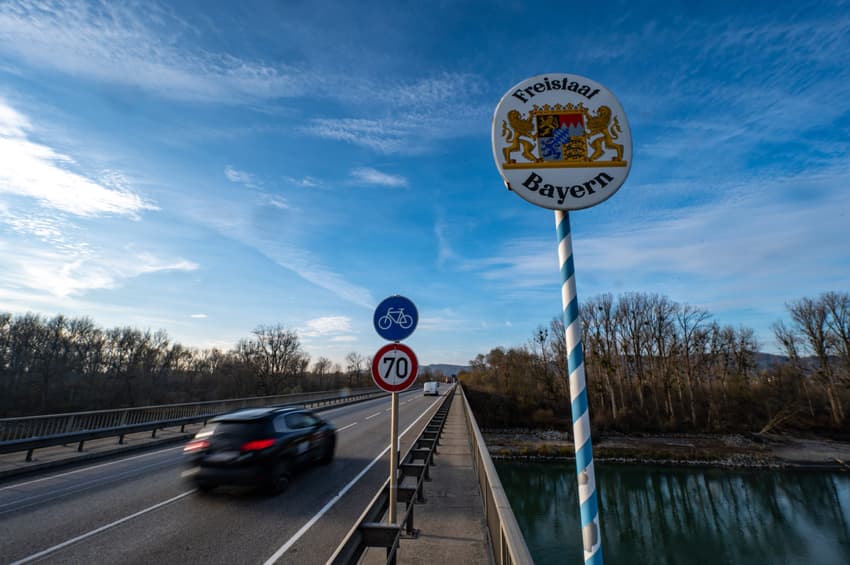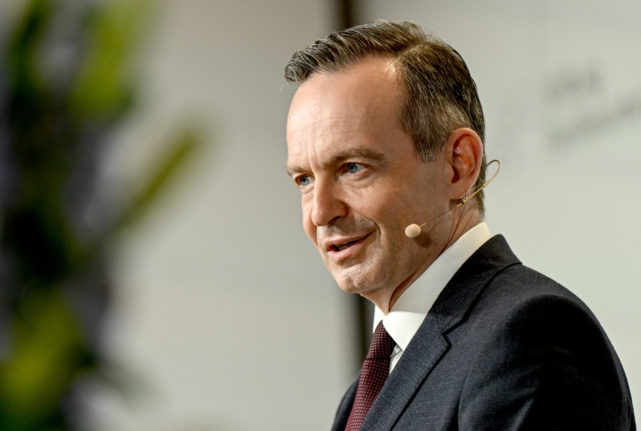German Transport Minister snubs Autobahn speed limit in climate plan

Transport minister Volker Willing (FDP) pledged to reduce CO2 emissions by improving public transport infrastructure but ignored growing calls for a 'Tempolimit' on Germany's famous motorway.
The FDP politician was setting out his plan for emergency climate protection measures on Wednesday in an attempt to correct Germany's course as concerns grow that the country is failing to meet its climate commitments.
Speaking at a press conference in Berlin, Wissing said his role as Transport Minister was to ensure that climate targets were met while also making sure that mobility wasn't restricted for the general population.
"I have to weigh up those responsibilities," he said, adding that climate protection was "one of the most important challenges of our time".
He pledged to set up more charging stations for electric lorries and embark on an "expansion offensive" to improve Germany's cycling infrastructure, as well as expanding the public transport network.
"That is particularly close to my heart," he said.
The Transport Ministry has also set its sights on so-called "eco-friendly fuels", which Wissing claims could save around 13 million tonnes of CO2 if widely adopted.
This, he said, would help Germany to not only hit but exceed its emissions targets in the transport sector.
READ ALSO: EXPLAINED: Germany’s new budget ticket for long-distance train travel
Earlier on Wednesday, Housing Minister Klara Geywitz (SPD) and Economics Minister Robert Habeck (Greens) set out plans for greater energy efficiency in homes and districts, including a ban on the installation of gas heating systems from 2024 and new funding for eco-friendly renovation and construction.
No Tempolimit, no Klimaticket
In his package of emergency climate measures, Wissing once again shirked calls for a temporary speed limit on the Autobahn.
Early on Wednesday, German Environmental Aid (Deutsche Umwelthilfe) had urged the government to implement a 100km-per-hour limit on stretches of the motorway as a first step in drastically reducing the country's emissions.
The speed limit should have a duration of at least two years, managing director Jürgen Resch told DPA.
"This would even be compatible with the coalition agreement, which only rules out a general speed limit," he explained. "After one year, it should then be examined how high people's approval is for a permanent continuation (of the speed limit) after the two years."
According to Resch, the limit would save around 10 million litres of petrol and diesel from day one and reduce CO2 emissions by more than nine million tonnes per year. Campaigners say this would also help as Germany tries to move away from dependence on Russian gas.
READ ALSO: Germany ‘doesn’t have enough signs’ for Autobahn speed limit, says minister
 Transport Minister Volker Wissing (FDP) speaks at an event for family businesses in Berlin. Photo: picture alliance/dpa | Britta Pedersen
Transport Minister Volker Wissing (FDP) speaks at an event for family businesses in Berlin. Photo: picture alliance/dpa | Britta Pedersen
However, the FDP is known to be firmly opposed to the move, having made the Tempolimit a red line in coalition negotiations.
At the press conference on Wednesday, Wissing also fielded questions about potential successors to the €9 ticket - including the introduction of a so-called 'Klimaticket', which was initially floated as a draft government proposal.
But the Transport Minister said no decisions had been made. Wissing said he has set up a working group with representatives from different federal states to look more closely at the findings from the €9 ticket.
Pointing to evidence of reduced traffic and an increased use of train during the summer offer, Wissing said he wanted to identify "the biggest appeal" of the ticket for any future offer.
This will be discussed at a meeting of the state transport ministers in autumn.
READ ALSO: Could a €29 ticket replace Germany’s €9 transport offer?
Fibre-optic cable expansion
Also on the agenda at the meeting was the expansion of high-speed internet and the roll-out of 5G in Germany.
The Transport Ministry said it had secured €50 billion in private investment for the installation of fibre-optic cables across the country.
By 2025, one in two households should be connected to fibre-optic internet, Wissing said, with every household due to be connected by 2030.
Comments (1)
See Also
The FDP politician was setting out his plan for emergency climate protection measures on Wednesday in an attempt to correct Germany's course as concerns grow that the country is failing to meet its climate commitments.
Speaking at a press conference in Berlin, Wissing said his role as Transport Minister was to ensure that climate targets were met while also making sure that mobility wasn't restricted for the general population.
"I have to weigh up those responsibilities," he said, adding that climate protection was "one of the most important challenges of our time".
He pledged to set up more charging stations for electric lorries and embark on an "expansion offensive" to improve Germany's cycling infrastructure, as well as expanding the public transport network.
"That is particularly close to my heart," he said.
The Transport Ministry has also set its sights on so-called "eco-friendly fuels", which Wissing claims could save around 13 million tonnes of CO2 if widely adopted.
This, he said, would help Germany to not only hit but exceed its emissions targets in the transport sector.
READ ALSO: EXPLAINED: Germany’s new budget ticket for long-distance train travel
Earlier on Wednesday, Housing Minister Klara Geywitz (SPD) and Economics Minister Robert Habeck (Greens) set out plans for greater energy efficiency in homes and districts, including a ban on the installation of gas heating systems from 2024 and new funding for eco-friendly renovation and construction.
No Tempolimit, no Klimaticket
In his package of emergency climate measures, Wissing once again shirked calls for a temporary speed limit on the Autobahn.
Early on Wednesday, German Environmental Aid (Deutsche Umwelthilfe) had urged the government to implement a 100km-per-hour limit on stretches of the motorway as a first step in drastically reducing the country's emissions.
The speed limit should have a duration of at least two years, managing director Jürgen Resch told DPA.
"This would even be compatible with the coalition agreement, which only rules out a general speed limit," he explained. "After one year, it should then be examined how high people's approval is for a permanent continuation (of the speed limit) after the two years."
According to Resch, the limit would save around 10 million litres of petrol and diesel from day one and reduce CO2 emissions by more than nine million tonnes per year. Campaigners say this would also help as Germany tries to move away from dependence on Russian gas.
READ ALSO: Germany ‘doesn’t have enough signs’ for Autobahn speed limit, says minister

However, the FDP is known to be firmly opposed to the move, having made the Tempolimit a red line in coalition negotiations.
At the press conference on Wednesday, Wissing also fielded questions about potential successors to the €9 ticket - including the introduction of a so-called 'Klimaticket', which was initially floated as a draft government proposal.
But the Transport Minister said no decisions had been made. Wissing said he has set up a working group with representatives from different federal states to look more closely at the findings from the €9 ticket.
Pointing to evidence of reduced traffic and an increased use of train during the summer offer, Wissing said he wanted to identify "the biggest appeal" of the ticket for any future offer.
This will be discussed at a meeting of the state transport ministers in autumn.
READ ALSO: Could a €29 ticket replace Germany’s €9 transport offer?
Fibre-optic cable expansion
Also on the agenda at the meeting was the expansion of high-speed internet and the roll-out of 5G in Germany.
The Transport Ministry said it had secured €50 billion in private investment for the installation of fibre-optic cables across the country.
By 2025, one in two households should be connected to fibre-optic internet, Wissing said, with every household due to be connected by 2030.
Join the conversation in our comments section below. Share your own views and experience and if you have a question or suggestion for our journalists then email us at [email protected].
Please keep comments civil, constructive and on topic – and make sure to read our terms of use before getting involved.
Please log in here to leave a comment.